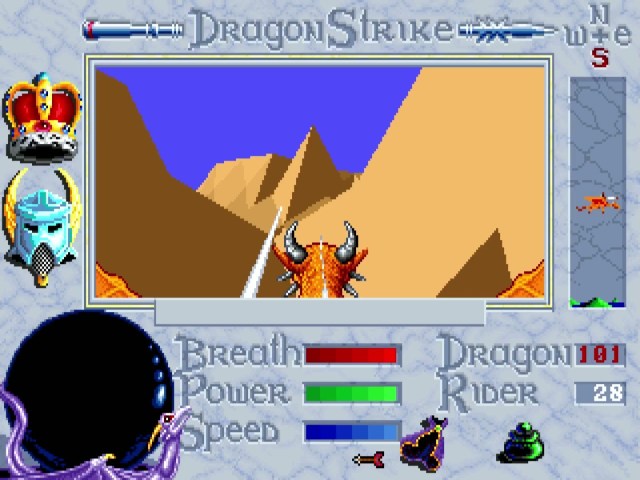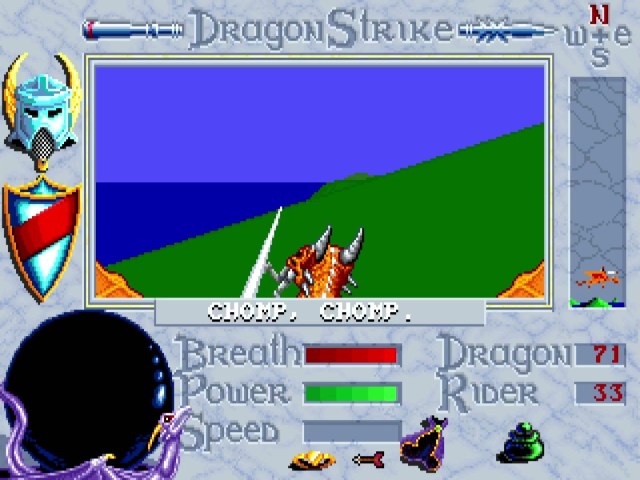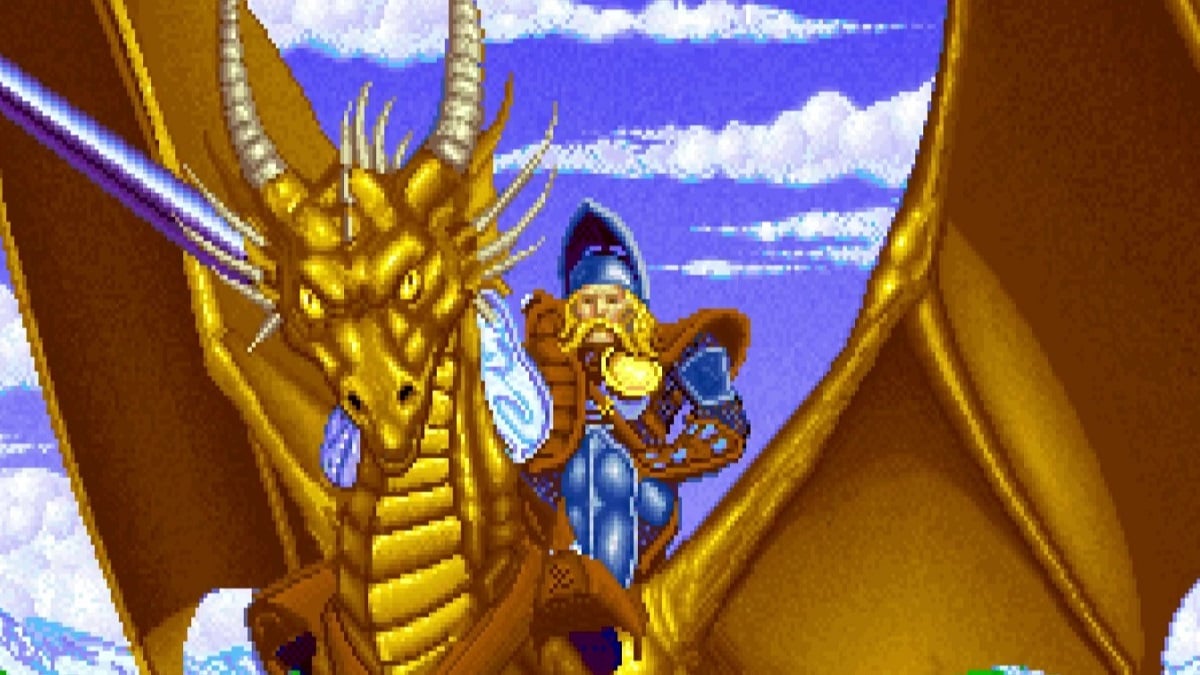When talking about SNEG’s efforts to re-release Strategy Simulation Inc.’s old PC catalog, I mentioned that one of their most significant endeavors was putting SSI’s D&D games back on storefronts. I bought them some time ago. I haven’t played them. They intimidate me.
Classic CRPGs are terrifying. I often say that game design doesn’t expire; it merely changes, but one common feature of ‘80s and ‘90s CRPGs is a wall of overcomplicated UI. The game itself might be relatively simple, but the sheer number of buttons, menus, and functions is staggering. I’ve been stopped while trying to create a character.
So, for the purposes of this article, I decided to finally step into SSI’s D&D world. Not in an RPG, goodness, no. I’m still terrified. Let’s, uh… Let’s start with 1990’s DragonStrike, the one where you ride on a dragon.

Good luck, Sir Goodman
There is a disappointing dearth of dragon-flight simulators. 2007’s Lair, perhaps? I don’t know, I haven’t played it. What I do know is that War Thunder doesn’t have dragons and is poorer for it. We’re all poorer for it.
DragonStrike is exactly that; it’s an Advanced Dungeons & Dragons game where you play as a dragon rider. It has a lot in common with computer flight sims of the time, right down to the simplistic fractal landscapes. Also, like much of the era’s flight sims, it’s surprisingly detailed.
I do know a few things about early flight sims, though it’s not my area of expertise. However, I know very little about Dungeons & Dragons. Most of what I know is from this year’s Baldur’s Gate 3, and I don’t know how well that still connects with Advanced Dungeons & Dragons. I’m not able to give much context there. It takes place in the Dragonlance world of Krynn. Then, after that, I’m just assuming that DragonStrike represents the subject matter reasonably well.
Although, the side you’re aligned with is literally referred to as the “Good Army” while the bad guys are the “Evil Army.” Is that actually in the material? Is that an accurate representation? Because that’s hilarious.

Patience and butterfingers
Actually, I can’t really talk about the plot told within DragonStrike all that well, either. It’s presented in literal walls of text, and I got frustrated because it takes “any key” as permission to advance. Early on, I missed a huge blurb because when I took my hand off the keyboard, I rolled the side of it off the right arrow key and missed a portion. So, the narrative had to compete against both my attention span and butterfingers, and it did not fare well.
So, that was a bunch of paragraphs saying I don’t know what I’m talking about. But there’s so much more to talk about. Dragons, perhaps?
You, unfortunately, neither get to pick nor customize your dragon. The one you ride on is based on what Order you’re in, and choosing your Order is based on narrative choice. There isn’t a tonne of difference between the dragons aside from what color is beneath your crotch. They all fly roughly the same, and all of them have two attacks. I think they get progressively more powerful, but there’s a tradeoff.
The flight model isn’t too realistic, or maybe it is. Maybe dragons actually fly like that. I suppose I should say it doesn’t feel realistic. You kind of just glide over the flat-shaded landscapes, and you might as well just be a detached camera. Despite being on a winged beast, you can’t just ascend vertically, stop suddenly, or drop straight down. It can also be difficult to tell how close you are to a cliff or the ground, and that placelessness removes a lot of the visual feedback from the game.
I’d guess that DragonStrike was a reskin of a WWII flight sim, but I can’t find anything similar in either SSI or Westwood’s catalog. Whether it’s an effective representation of dragon pilotry or not, it’s an impressive effort for 1990.

Tooth and claw
While the actual flight is maybe oversimplistic, there’s still a lot of depth to the game. Beyond your dragon’s breath, you also have your trusty lance to attack with, as well as your sword and your dragon’s claws and teeth. Most of these are beyond your control and just happen when you get close enough to an enemy. You can aim where your lance is pointed, but I’m not sure if there’s a practical reason to do so.
However, your lance is actually the most reliable way of taking down enemy dragons. The hard part is simply to light them up in front of you, but if you manage to poke them, they typically go down immediately. Your dragon has two scents of breath. One goes fast and far, and the other goes slow and lingers. There isn’t much feedback on how much damage they do, but they’re often not an instant kill.
You’re normally fighting other dragons, and that means they can also claw and bite. This is where combat starts to get really messy. You have separate health meters for your rider and dragon, and who takes damage when things get up close isn’t really clear. For that matter, the amount of damage seems random and may be the result of invisible dice rolls. There’s a confusing lack of control when it comes to combat, and this gets frustrating.

The Knights of the Inept
What drove me to the edge was getting blindsided by enemy projectiles. I’m okay with getting hit by something offscreen, but often, this would just be an instant kill. My rider would get vaporized suddenly, forcing me back to the retry screen. I’d be doing really well one moment, then it would be over in an instant. If I was merely taking damage and needed to quickly remove myself from the situation, that would be one thing, but not even having the ability to react is frustrating.
I got stuck at a point midway through DragonStrike. The above situation kept happening, over and over. So, I checked the manual and found part of what was going wrong. You’re given the option to join orders in DragonStrike. You start in the Knights of the Crown, and can switch to Knights of the Sword, before finally having the chance to enter the Knights of the Rose. But beyond just upgrading your dragon, it also sets you on a harder path through the story. I was in the Knights of the Rose.
So, I restarted and refused the offers to join the other Orders. Sure enough, I was suddenly plowing through the story, galvanized by a stint in hard mode. Then, I got stopped by a mission where I was getting whittled down by archers. I could probably overcome it with some carefully placed shots, but by then, it was midnight. This may surprise you, but I keep regular hours, so I needed to be up for work in the morning. And that’s why my homework isn’t finished.

Soaring recommended at 6MHz or faster
I still wound up spending a lot of time with DragonStrike, and when I have the chance, I’ll probably dive back in to finish it. Even with its simple mission design and intangible physics held back by the restrictions of the technology at the time, there just isn’t much out there like DragonStrike.
Furthermore, I think the developers behind the game were enthusiastic about the subject matter. While, again, there were a lot of technical limitations, they still tried to get as much detail as they could into the game. You can even be dislodged from your mount and freefall toward the ground. Your dragon will try to catch you, but it might fail, and it’s game over. This would be a very cinematic moment in a modern game, but the fact that it’s in a DOS game from the 90s is a nice touch.
Early flight sims may seem superseded by technological advancements, but there’s still value in seeing how developers got around the limitations of the era. They can still be appreciated for their art.
This goes doubly for DragonStrike. Not only did the developers at Westwood have to deal with the limits of home computers at the time, but they also had to think about how they would represent the fictional warfare of dragon fights. The result is something that is somewhat compromised and often frustrating, but it’s endearingly earnest. It’s enough that I still want to dig deeper into the game, and when it comes to retro titles, that’s half the battle. Plus, dragons.
For other retro titles you may have missed, click right here!


